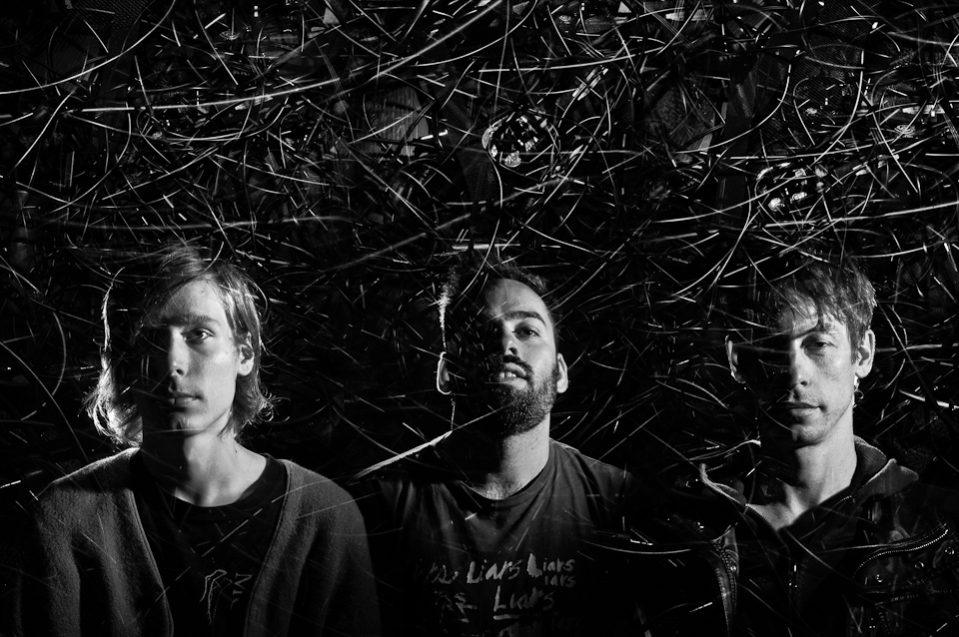Interview: Odonis Odonis talk Post Plague, tech & more

Featured photo by Oleg Pulemjotov
Imagine a world in which technological advances have overtaken our humanity, leaving us plugged into another reality and disconnected to the world as we know it. Narcissism controls our actions, driven by the need to project a better, more perfect image of ourselves in this dark new digital reality.
This may sound like a science fiction story to you, but Toronto’s Odonis Odonis‘ insist that this future is very real and very imminent on their new album Post Plague (Telephone Explosion). Our new advanced “digital age” was meant to bring us closer together, as tools such as social media, immersive gaming, and virtual reality offer new ways for us to connect to one another and experience new frontiers. However, the opposite may actually be true, as this age is increasingly pulling us into our screens and imposing pixilated blinders on us that separates our consciousness from that of the physical world. Pretty scary stuff, eh?
Odonis Odonis isn’t one of those bands that settles. Their continuous shift in style and sound may seem incongruent with the music industry, which as we know is full of stagnant and formulaic pop bands that pretty much all sound the same. However, Dean Tzenos and his band have different ideas about their music, their performances, and their overall approach to creativity and art altogether. Back in 2010, you might have pigeon-holed them as a surf-rock band, but Odonis Odonis has since fused together rock, industrial, punk, electronic, and more and consistently push themselves sonically, breaking new ground. If there’s a few things that we love about Odonis Odonis that haven’t changed, it’s their dark, aggressive, and unbounded approach to music.
I spoke with Dean recently about the theme behind Post Plague and what that might mean for us humans moving forward. Be sure to check out the brand new video for “Needs” below, directed by Scott Cudmore. Odonis Odonis plays House of Targ on Thursday, August 25. $10 / 9pm / 19+.
Interview with Dean Tzenos of Odonis Odonis
Post Plague has an urgency to it that to me reminded me of hearing Trent Reznor for the first time. It kind of hits you in the face. Did you have an idea of how you wanted the record to sound initially? Or did you let the theme guide how the music was produced?
It kind of took a while for it to make sense and there was a lot of trial and error. We knew we wanted to go in a different direction, but we weren’t 100% sure what that was. I grew up listening to a lot of industrial music and I wanted to incorporate some of that onto this record. No one has really done it the way I’d like to hear it in a long time, going back to industrial’s earlier roots and updating the sound. We even tried to let some dark electronic and techno seep in, and electronic production as well. It took a while to fully form what we were trying to create. We were also trying to be minimal, but I’m not sure it came off that way in the end [laughs].
This album sounds different that your previous releases. As musicians, how important is it for you to continuously push the envelope and evolve your sound or approach?
I feel like that’s the only reason for us to be around at this point. The thing I find really exciting is when you find new ground and do something different. The way the music industry is now, I mean we’re not trying to be some kind of pop band, so we can keep doing new things and finding new territory to explore. Personal growth is what we get off on. We’ve already finished the next record, too, and are already working on the one after that. It really is our band’s goal to keep moving forward. I think when we stop pushing ourselves is when we’ll quit.
How have fans reacted to your change in direction?
For the most part it’s really positive. I think we’ve probably alienated some of our older fans for sure, but most people come to our shows and really love the experience. A lot of bands play it safe and I’m not sure why you’d need to that any more. Music should be liberating, not some cookie-cutter mould. At our shows people are really accepting and love what we’re playing, and sure some might be disappointed that we’re not playing as much of our older stuff, but we did for four or five years. We might play those songs once in a while for nostalgia’s sake but we’re just excited to be expanding our fan base.
Science fiction is often concerned with technology going overboard and one day coming back bite humanity in the ass. But Post Plague is based in reality. Can you discuss how that is?
I think we lose our personal connection between each other with modern technology, and it’s under the guise of bringing each other closer together. Don’t get me wrong, I love this stuff and I use it, but we’re giving something up to gain something else. Learning more about VR and advances in technology like that, it’s really like a lot of us are living in a fake world. We just dropped a video that uses VR, and it’s so strange to think that so many people growing up now have their video games, porn, everything they want right in front of their faces in their basement. We’re not going to know this affects everyone for a while. Look how quickly social media has taken over, too. In just five years I have seen a major shift in how people interact on personal levels and I think we can agree that social media and our devices has something to do with that.
One idea that struck me was this concept of “Flawed Flesh” – which looks at humanity’s narcissistic tendencies and how technology exacerbates this to the extreme. Can you elaborate on this, and how it fits into the album’s theme as a whole?
Yeah, totally. Songs like “Nervous” talk about that completely. You’ll see a selfie with 100 likes and so many comments of “approval” – I mean, is that real? Fishing for compliments and presenting themselves on these social media platforms, these people aren’t really showing who they are. This is just the tip of the iceberg, too. If you start thinking about VR, creating avatars, or artificial intelligence once the technology gets there, I just see our society getting more narcissistic moving forward.
I see that reflected in music too, in DJ culture. I’m not trying to shit on it altogether, and I don’t have any serious beef or anything, either. But DJ culture is all about the crowd, providing them with whatever they want. It’s kind of what we’re talking about on our album.
You’ve toyed with virtual reality (VR) and offered something different for people to experience your music. Do you have an idea of how you’d like listeners to consume this album?
I think it’s such a new medium, it’s hard to say. They tried to do this in the 80’s and 90’s, but never to the degree they’re doing VR today. I think it’s here to stay. It’s really creepy, actually, tricking your senses completely into thinking you’re immersed in this different world. This is only 1st generation VR technology too, the graphics are going to be even better and fully immersive. You could spend hours and hours in that world and feel like you’re living it. Going from one perspective in VR to another is really jarring for our brain, and I’m totally blown away by the potential of it.
From an artistic standpoint, the possibilities are pretty cool. For something like VR, no one really knows how it will be used yet. I make music, but I’m also involved in film and it’s exciting because it’s a whole new platform that no one has really figured out yet. We’re fusing the VR technology with the music, it’s exciting as much as it is terrifying [laughs].
Do you have any tricks up your sleeve for the live performance? What can people expect if they’ve never seen Odonis Odonis before?
It’s a pretty intense and visceral experience. As much as we change from record to record, we change our live shows too. We really get bored quick, so depending on when you’ve seen us, you’re usually guaranteed to be in for something different the next time around. If you’re expecting a regular rock band, we’re not into that. Sometimes we’ll throw back and play parts of sets like we used to, but normally we just keep trying to give people something new to experience.
